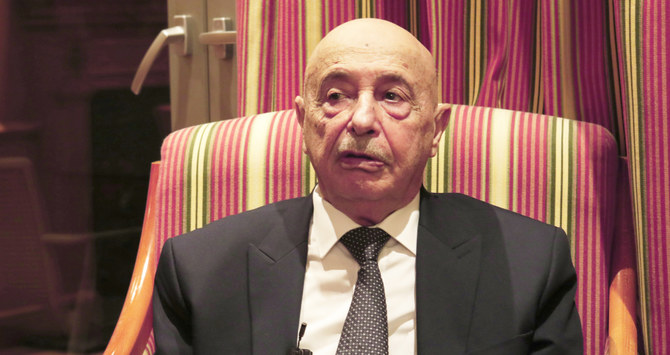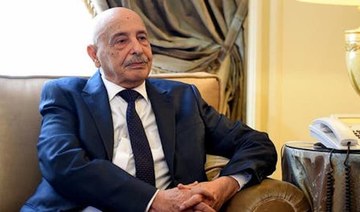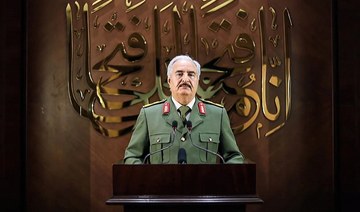CAIRO: Aguila Saleh, the speaker of the Libyan House of Representatives, said that the resumption of oil exports, the situation in Sirte and the prospects for a ceasefire were among the subjects he discussed with American Ambassador to Libya Richard Norland during two days of talks in Cairo this week.
In an exclusive interview with Arab News, Saleh said that they talked about the damage to Libya and other nations resulting from the oil blockade caused by the civil war in the country, and the need to ensure that revenue from oil exports do not end up in the hands of militant groups or foreign proxies.
They agreed that to prevent oil revenues being stolen or diverted, they should be held in the Libyan Arab Foreign Bank and not the Central Bank in Tripoli, until a new government is formed. Saleh said that Norland agreed that the headquarters of the new authority should be in the city of Sirte, protected by the Libyan army.
The hopes for a ceasefire and the withdrawal of militias and mercenaries were also discussed, along with UN talks that aim to accelerate negotiations for a political solution that could allow a new government and Presidential Council to be formed by September.
Arab News: What were the results of the meetings you held with the high-level US delegation in Cairo?
Saleh: I met the American ambassador to Libya, Richard Norland, and we discussed a number of important issues (including) the attempt to convince the Libyan people to resume oil exports, because the current situation of the oil corporation is negatively affecting the countries that benefit from exports, as well as Libya itself.
It was agreed to keep oil revenues in the (Libyan) Arab Foreign Bank, to prevent them being seized from the Central Bank in Tripoli by mercenaries. As is known (disagreements between) members of the Presidency Council (have revealed) the extent of corruption in this sector … and therefore oil revenues will not be disposed of until after a new Presidency Council and government are formed.
AN: Was the situation in Sirte discussed? Will the Libyan National Army withdraw, as has been reported?
Saleh: We had a previous proposal that was discussed, which is that the city of Sirte be the location of the new authority, the Presidential Council and the government, so that those in the east and west come to it. (Norland) was convinced by this proposal, and the idea that the Libyan National Army would protect the state’s headquarters and institutions. He also backed a ceasefire agreed through the support of the UN and the US administration.
AN: Will the other side in the dispute, led by the Al-Wefaq government and Turkey, agree to a ceasefire?
Saleh: (Norland) promised to convince them and end this tampering that is destroying the Libyan state. I believe that the meeting with him went very well and he understood everything that I proposed for the implementation of the Cairo Declaration. This includes all the initiatives (required for) a political solution that spares Libya and its people from the dangers of war, (highlights) the importance of peace and rejects foreign interference.
AN: What is the role of the UN during the next stage? Has coordination and communication begun yet?
Saleh: We have asked the UN to supervise the restructuring of the Presidency Council and the government in the near future according to the Cairo Declaration, which won almost unanimous support from Libyans and all parties that support ending a war that they see as a loss for all. The belief is that what can be achieved in peace is much better than the continuation of the war.
AN: Has a US proposal to demilitarize Sirte and deploy international forces been discussed?
Saleh: This matter has not been discussed and we have not seen any proposal for the presence of state forces. Rather, the Libyan National Army will protect the city and the new headquarters of the authority.
AN: Who will choose the members of the new government and Presidency Council? Will it guarantee that the model employed by Prime Minister Fayez Al-Sarraj, leader of the Government of National Accord, is not repeated?
Saleh: The government will choose the members of a dialogue committee formed by the House of Representatives and the State Council, known as ‘13+13’ in accordance with the Cairo Declaration.
It takes into consideration the three regions and, on that basis, a presidential council will be formed that consists of three members: the president and two deputies, one from each of the three regions.
Then, a prime minister will be assigned — from a region other than the one from which the president was chosen — and form a government that will submit its program to the House of Representatives for approval.
AN: Has a timetable for reaching this stage been agreed?
Saleh: We have agreed a timetable for the implementation of the stages of the Cairo Declaration. Meetings will be held with the UN from Aug. 16 to Sept. 16, until the new authority is formed. (Norland) supported this and confirmed his support for these dates.
AN: Can Al-Sarraj be convinced to support this?
Saleh: Al-Sarraj is not part of resolving the crisis. The solution is in the hands of both the House of Representatives and the State Council.
AN: How does Turkey explain its continued deployment of mercenaries and weapons to Misrata and Tripoli?
Saleh: The issue is about achieving interests, which will not be imposed on us by force. If Turkey wants to pursue its interests through peace, there is no disagreement. Consequently, we stressed to (Norland) the importance of the departure of mercenaries from Libyan land — and they have already started to flee.
We have previously assured the EU that the continuation of the Turkish war (in Libya) and an escalation will lead to great losses and damage to all of Europe. They are convinced of that and therefore they are keen for a calm and peaceful solution to be found, which is a way out of the current crisis for everyone.
AN: How do you view the Russian position on Libya? Are there any updates?
Saleh: I previously visited Russia and met Foreign Minister Sergei Lavrov. They are supportive of the Cairo Declaration and the vision of parliament, and they listened well to what we presented to them. Likewise, during my tour of Algeria, Morocco, Tunisia and Jordan.
I sensed that everyone supports a political solution and the Cairo Declaration, which is the culmination of all of the initiatives, including Berlin.
AN: Do you think that there is now a US-Russian consensus on Libya?
Saleh: Certainly, because everyone is convinced that their interests are best achieved through peace and not a war that hinders pumping oil.
AN: How do you explain the tone of the Al-Wefaq government, which continues to announce the importance of restoring Sirte and continuing the war?
Saleh: The Al-Wefaq government reached a dead end and did not present anything. Recently they started disagreeing with each other and making blatant accusations about corruption. Al-Sarraj cannot make decisions because they are supposed to be issued unanimously, but with his disagreement with his deputies, all his arguments are dropped.
This, in addition to the allegations of corruption, made recently by (Deputy PM Ahmed) Maiteeq, means Al-Sarraj cannot present anything. He is delegitimized in the eyes of the people and the members and the House of Representatives. He wants to continue in his position to implement what the Turkish regime wants.
AN: So the legitimacy in Libya now rests with the “red line” (as the strategic city of Sirte was described in June by Egypt’s President Abdel Fattah El-Sisi) that must not be crossed to prevent the further escalation of hostilities?
Saleh: Certainly, the red line has resulted in avoiding escalation (and) played a major role in protecting the unity of Libya, its land and people. It is, in my estimation, a large and important (step) in reaching the peace that everyone seeks, in a crisis that has gone on longer than it should have.
Therefore the red line, announced by President El-Sisi, is considered a great effort to stop the bloodshed among Libyans and convince everyone that a political solution is better than continuing to fight. I consider it a historic position for Egypt and its leadership.
AN: Did you agree with Norland any plans for further rounds of talks?
Saleh: We agreed to continue the dialogue. The ambassador emphasized the interests of the American administration, which has intervened at the appropriate time — and it is a very important intervention.
It is expected that I will visit the US to speak before the American Congress and present to them the facts of the situation on the ground, and the vision of the Cairo Declaration and the implementation mechanism.
AN: What is the role of the Libyan House of Representatives during this stage? Will it meet soon?
Saleh: The council is ready to take any practical positions and there is no disagreement about the political solution. We have a constitutional declaration that the required amendments can be introduced, with regard to the new authority, and approved.
AN: What about national reconciliation?
Saleh: Efforts are constant and there is no dispute among Libyans over support for a political solution and a fair distribution of power and wealth. These tasks will be completed by the new authority after it is formed on the basis of the three regions.
AN: What is your view of the security and economic situations in Libya?
Saleh: The security situation is stable and under the control of the National Army. So is the economic situation. Salaries are paid regularly and food commodities are available.




























